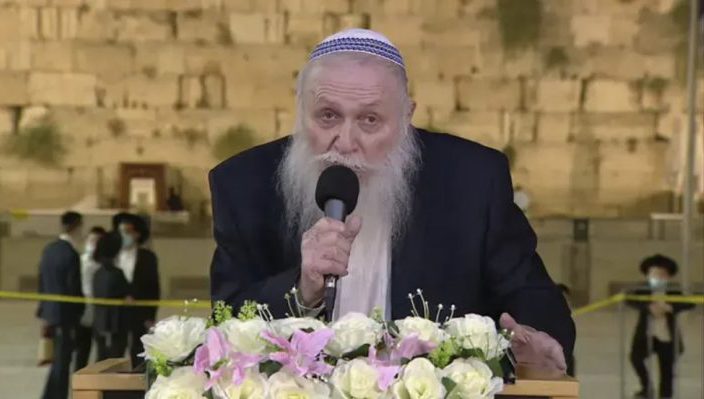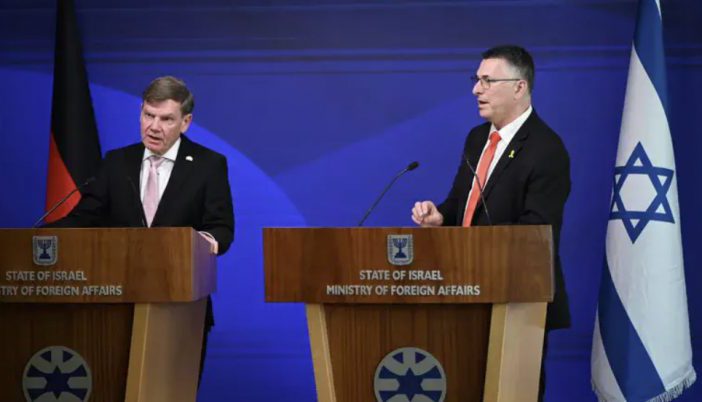Great and formative events have occurred in Israel’s history, but there is always concern that the next generation— who did not experience the events firsthand—will forget them or lose the values and lessons derived from them. That is why Jerusalem Day was established.
This article is an extract from Rabbi Chaim Drukman’s book, “La-zeman Hazeh,” a series of essays about Jewish holidays, including “new” ones that were established in the last hundred years to celebrate the Jewish people’s return to the Land of Israel. Adapted and translated by Moshe Goldberg
A Vision of Eternity
King David was the one who established Jerusalem as the capital of our nation. Until his time, the city was under the rule of the Jebusites. David longed deeply to be the one who would build the Temple—the dwelling place of the Divine Presence—but God held him back. Nevertheless, David did not refrain from preparing the foundations and raw materials for the construction of the Temple for his son Solomon. He also called upon his people to help with the preparations, and after his efforts bore fruit, David rejoiced greatly and blessed God in front of all Israel (I Chronicles 29:10–11):
“Blessed are You, Lord God of Israel our father, forever and ever.
Yours, Lord, is the greatness, the power, the glory, the eternity, and the splendor; for everything in heaven and earth is Yours. Yours, Lord, is the kingdom; You are exalted as head over all…”
In Tractate Berakhot (58a), the Sages interpret David’s words in various ways. Specifically, regarding the word “eternity” (ha-netzach), Rabbi Akiva explains: “This is Jerusalem.” Jerusalem connects us to the world of eternity, lifting us above the transient, the accidental, the fleeting.
The Eternal Nation
Through the lens of eternity, we first encounter the eternal people—Israel, referred to as the “Eternity of Israel” (I Samuel 15:29).
Looking back at our nation’s long history, one can only be astounded by our continued existence, which defies natural explanation. This is a people who emerged as refugees from terrible conditions and slavery under a mighty empire—Egypt. A people who wandered the desert for forty years, stormed a populated land, conquered the territories of seven nations, and centuries later established a mighty kingdom that became a dominant regional empire.
And yet, even after the unimaginable destruction of the Holocaust—with over six million murdered in horrific ways and thousands of ancient communities wiped out within a few years—the Jewish people survived. We rose again, renewed and full of vitality, built a developed state with political independence and military superiority over a hostile region. A state whose every action is broadcast worldwide, as if it were one of the global superpowers.
Can one look at the reality of the Jewish people without rubbing their eyes in disbelief—the answer is that this is real, witnessed and shaped by the world, for better or worse.
The Eternal City
The Jewish people are the eternal nation, and Jerusalem is its eternal capital. Jerusalem is not an isolated city; it is the culmination, the summit of the Land of Israel.
“Jerusalem is holier than all of the Land of Israel.” Beyond the simple level of sanctity, my teacher Rabbi Tzvi Yehuda Kook z”l explained that Jerusalem’s holiness flows from the holiness of the Land of Israel—it is the peak of that sanctity. Our Sages also taught that all of the Land of Israel is folded into Jerusalem, like a pyramid.
God promised that even when Israel is exiled, the Land would remain loyal and not allow foreign nations to settle it. There is a deep, eternal connection between the Land of Israel and our people. It has always been ours, and its destiny is eternally tied to ours.
We are “believers, children of believers” (Shabbat 97a), trusting in the words of the prophets who assured us in God’s name (Joel 4:16–17, 21): “The Lord will roar from Zion and thunder from Jerusalem; the heavens and earth will tremble. But the Lord will be a refuge for His people, a stronghold for the children of Israel… Judah will dwell forever, and Jerusalem from generation to generation… and the Lord dwells in Zion.”
Victory on the Path to Eternity
Regarding the eternal nature of Israel, Rabbi Abraham Isaac Kook z”l wrote (Olat Re’iyah, “And David Blessed,” –“The Splendor”): “The national strength of Israel has faced many obstacles and will face more—but all will be overcome by God’s power, and it shall endure forever.”
Great and formative events have occurred in Israel’s history, but there is always concern that the next generation—those who did not experience the events firsthand—will forget them, and worse, lose the values and lessons derived from them.
We already see this happening today, only a generation removed from those formative times. That is why Jerusalem Day was established—to commemorate the liberation of Jerusalem and other parts of the Land of Israel in the Six-Day War. This memorial and holiday remind us that the existence of the State of Israel and the liberation of Jerusalem are not to be taken for granted.
The verse from Psalms 98:3 was fulfilled before our eyes during that war: “He remembered His kindness and His faithfulness to the house of Israel; all the ends of the earth have seen the salvation of our God.”
Likewise, Isaiah 52:9–10 has come true: “Burst out, sing together, ruins of Jerusalem! For the Lord has comforted His people, He has redeemed Jerusalem… and all the ends of the earth will see the salvation of our God.”
Gratitude, Not Ingratitude
Jerusalem was returned to us during the Six-Day War—but we must remember that this was not by our own initiative. No one planned to capture Jerusalem. God forced our hand.
On Monday morning, as the war began, our Prime Minister sent a message to King Hussein of Jordan (who then ruled over Jerusalem), stating: “We have no quarrel with you. If you stay out of the war—we will not touch you.” But as Proverbs 19:21 says: “Many are the plans in a person’s heart, but the counsel of the Lord—it shall stand.”
God had other plans. He hardened Hussein’s heart, and Jordan entered the war—fulfilling the divine plan. That was divine guidance—God’s roadmap to Israel’s redemption and true peace.
And how can we even entertain the idea of negotiating over Jerusalem? Even if we have no intention to give it up, the very discussion suggests to the nations that we might! This is a terrible desecration of God’s name.
Awakening the Eternal Strength
The history of the Jewish people is full of difficulties and crises—but all were temporary. The harshness of exile is like clouds covering the sun. The sun—our inner spiritual essence—still shines.
When the wind of faith and Torah blows, the clouds disperse, and the eternal light of Israel shines again. “And eternity—this is Jerusalem.”
Jerusalem awakens the eternal powers of the Jewish people, hidden within us even when they seem lost. These powers were revealed in the Six-Day War when we returned to Jerusalem. We must continue to reveal these strengths today. As Nehemiah once called out (2:17): “Come, let us rebuild the wall of Jerusalem, and we will no longer be in disgrace!”
This includes both physical and spiritual walls.
As opposed to all the temporary political plans for Jerusalem and the Land of Israel, God’s eternal plan for Israel’s redemption appears, as it was revealed in our generation.
And now, we must reinforce our faith and trust in our people. On the day Jerusalem was united, let us also strengthen the bond between the earthly Jerusalem and the heavenly Jerusalem. This connection holds the key to our true redemption. Without faith and Torah—there is nothing. Without nourishment from the heavenly Jerusalem, even the earthly one is in danger.
For the Sake of Jerusalem
At one of the most desperate moments in our history—when the sea was in front of us and the Egyptian army behind—our ancestors stood trembling. Moses prayed, but God said to him (Exodus 14:15): “Why do you cry out to Me? Speak to the children of Israel—and let them move forward!” Rabbi Yishmael explains. God told Moses:
For the sake of Jerusalem, I will split the sea for them (Mekhilta d’Rabbi Yishmael).
For the sake of Jerusalem God redeemed us from Egypt.
For the sake of Jerusalem, He split seas and guided us through deserts.
For the sake of Jerusalem, God preserved us for millennia. Thanks to the city, we returned to the Land of Israel and established the State of Israel—to fulfill our divine mission in this world.
And — For the sake of Jerusalem, we will overcome all current and future challenges.
Jerusalem, the light of the world, will light up all corners of the earth.





